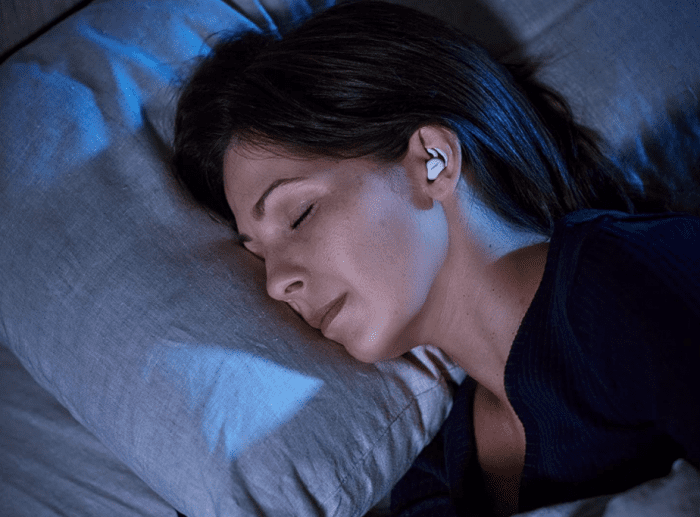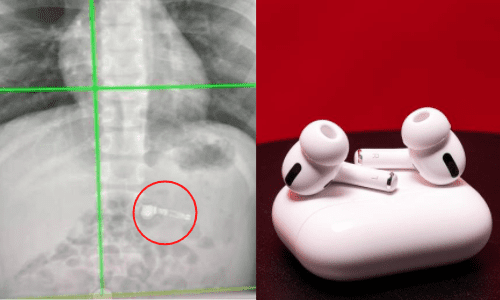Listening to music before bed can be the most relaxing thing you can do to put your mind at ease. Or maybe you get home from work and want to read a book, but you are just too tired. In these situations, you pop your AirPods in and drift off into a fantasy world with an audiobook.
But, while everyone is focused on can you sleep with AirPods in? No one seems to wonder, should you? Sleeping with AirPods in can lead to cancer risks, ear infections, wax buildup, pain, hearing loss, sleep disruptions, and even losing and swallowing the AirPods.
You most definitely can sleep with them at night, but you have to decide if you are willing to take on all of the risks that come with it. AirPods are wireless earbuds, and as such, they rely on radio frequencies to communicate with the iPhone or iPad.
As a result, sleeping with AirPods on occasion is generally deemed safe. However, long-term exposure to loud music can develop a variety of hearing problems, particularly when sleeping.
Why Do People like Sleeping with AirPods In
Many people like sleeping with music playing as they find it soothing, and it helps them to fall asleep faster. But just because they find temporary relief, it does not mean that it is a harmless thing to do. Still, let’s go over some of the reasons people give for sleeping with AirPods.
No Wires to Get in The Way
There is always the risk of pulling on them while sleeping and causing harm when using wired earpieces. AirPods do not even have a wire, so they will not get in the way when you are sleeping. You won’t have to worry about them falling out of your ear or rolling onto the cable and ruining it because they are wireless.
Good Way to Block out Noise
AirPods can be a nice method to block out noise while sleeping. Even if you’re not listening to anything, using both earbuds can make you feel like you’re wearing earplugs. Loud, intrusive noise, such as construction, traffic, or a noisy roommate, can be suppressed by playing music or using a white noise app.
Easier to Fall Asleep
Having some music playing in the background as you sleep can help take your attention away from distractions. This can lead to a more restful night’s sleep and a more active morning. Things that you enjoy listening to help your brain produce serotonin or the “feel-good” neurotransmitter. If you were in a foul mood when you went to bed, listening to music that you appreciate could make you feel better.
The Lurking Dangers of Sleeping with Your AirPods
Sleeping with your AirPods can and will cause some long and short-term dangers. And some of them can carry pretty severe consequences for your health. You do not want to wake up with lost hearing.
The most common risks associated with sleeping with your AirPods include earbuds falling out and being misplaced, wax buildup in your ears that can lead to infection. Hearing loss if the volume is turned up to more than 60% for more than 1 hour of use, physical discomfort, and feeling fatigued in the morning due to shallower sleep.
More severe consequences could include missing crucial sounds, such as your smoke alarm or carbon monoxide monitor going off. There is even a danger of cancer or damage to brain cells. Even though there are not many studies done about them, AirPods are devices that use radio frequencies known to emit radiation.
Build up of Ear Wax Causing Infections
The usage of AirPods or any other form of earbud on a regular basis can speed up the accumulation of earwax in your ear. Too much earwax can cause hearing loss and a buildup of dirt and bacteria in your ear, which can trigger allergic reactions and inflammation.
When ear wax builds up in your ears as a result of frequent usage of AirPods, the risk of infection rises. This is because your ears are intended to clean themselves, and using an earbud might obstruct this process, resulting in a build-up of wax.
Otitis externa is a bacterial infection that can affect your ears. It can also be caused by damage to the skin inside your ear, putting a cotton bud too far, or obstructing the ear canal with earbuds, all of which result in pain and inflammation.
Hearing Loss and Tinnitus
Sound waves are converted into nerve signals by microscopic hair in our ears, which are then interpreted by the brain. Loud noises harm these hearing organs, resulting in ringing in the ears, known as Tinnitus.
If you continue to do so, you will get persistent hearing damage or possibly hearing loss. According to the Centers for Disease Control and Prevention, listening to music through your AirPods at levels exceeding 105 – 110 decibels (dB) can cause hearing damage in less than 5 minutes.
The maximum volume level of your listening device is roughly 105 – 110 dB. Therefore lowering the volume to nearly half will reduce the (dB) to a more comfortable level.
Potential Physical Damage to Your Ear
If you sleep on your AirPods throughout the night, you risk damaging your ears. The earbuds pressing into your ears at an uncomfortable angle would most likely cause mild discomfort.
In more severe cases, prolonged, concentrated pressure on your ears may result in skin cell death. When there is a shortage of blood flow to cells and tissues in an organ, necrosis occurs, leading them to die.
This is one reason why you should avoid angling the earbuds to keep them in your ears more firmly, since this may increase the danger of the earbuds being driven further into your ear, perhaps causing injury.
Blocking out Important Sounds
This is a very likely scenario as the AirPods block out sounds, and you do not want to miss some of them, like alarms going off. Warning you of potential danger, you may miss someone knocking on your door or your smoke alarm ringing if your volume is loud. Consider lowering the volume to avoid such situations.
Disturbance to Your Sleep
It might be difficult to sleep if there is a continual sound in one’s ear, regardless of loudness. Even if you are fast asleep, the noise may prevent you from reaching the relaxed condition essential for your body to heal fully.
Constant noise can activate your nervous system, heart rate, and stress hormones to the point where you can not fall asleep deeply enough. This can cause tiredness and lethargy in the morning.
Risk of Swallowing The Airpods
It is unlikely that you will fall asleep in your AirPods and swallow one of the earbuds. However, according to Fox News, one verified incidence of this has occurred.
Ben Hsu of Taiwan, for example, slept with both earbuds in but could only find one when he awoke. He noticed that he had swallowed the other earbud after enabling the tracking feature on his iPhone.
An X-ray at the hospital confirmed this. While the surgery was on the table, the earbud became lodged in his digestive system and passed without trouble and was in good functioning condition afterward.
Can Overuse of AirPods at Night Lead to Cancer?
This is a hotly debated topic that will require more in-depth investigation and more time to draw a firm judgement on either side.
The biggest concern is the unknown long-term effects of exposure to the low-energy radio frequency (RF) radiation released by the Bluetooth technology that enables wireless, short-distance data transfer between your AirPods and your iPhone or iPad. Related: Bluetooth vs. Wired Headphones Radiation
Because these RF transmitting gadgets will be in direct touch with your ears and surrounding cells, this grey area is of particular worry if you plan on sleeping in your AirPods for the duration of the night. According to some studies, AirPods generate more electromagnetic radiation than traditional wired earphones and other wireless earpieces.
AirPods are safe for short-term use, as it takes more time for the radiation to reach the brain. When it comes to sleeping with AirPods in the long run, however, you can be sure that it will be detrimental to your health. After all, you are inserting a pair of radio devices into your ears. If you want to be safe, you should use wired headphones instead.
Alternatives to Use Instead of AirPods at Night
If you want to block out the noise at night and find that AirPods are highly effective, you may wish to continue using them. However, the fact that AirPods are still wireless radio transmitters remains. And with all the dangers of EMF radiation exposure, we would not recommend using them during your sleep if you want to be safe.
Sleep Headphones
There are a number of wireless sleep headphones on the market that are specifically engineered to fit comfortably without causing the earphones to fall out. These may appear to be a headband at first glance, but they are actually “specific sleep headphones.”
These are a lot more pleasant than most other headphones that have earplugs pushing into your ears while you sleep, plus they also double as eye masks. Because it uses small speakers and a flexible headband for comfort, the Navly V5.0 Sports Headband Headphones appear popular.
Noise Canceling Earmuffs
These are not headphones, and they are often used in noisy areas for hearing protection. But nobody is preventing you from using the earbuds below. Earmuffs are not the most comfortable way to sleep, but they do not require batteries to work. So, therefore they are a better option than the harmful radio frequencies of AirPods. You can even use the earmuffs in combination with earplugs for more silence during the night.
White Noise Generator
If you have never heard of white noise before, it’s essentially “pleasant noise” that aids sleep. Sounds from a fan, a waterfall, rain, or thunder are some examples. You can not always count on nature to rain whenever you want to sleep, but white noise generators are available for purchase online. You just need to put the machine in the corner of your room, and you will be able to fall asleep to the soothing sounds of mother nature.
You can use the Manta White Noise Machine to constantly play a sound or set a timer for seven hours. People are also claiming that this equipment is reducing their tinnitus symptoms. Or you can even download a white noise app on your smartphone. Some apps that you can download are:
External Speakers
Consider using an external speaker instead if you are sleeping in a relatively quiet environment. Soft background music or white noise, albeit not directly in the ears, will assist people in sleep. Of course, with the exception of the radiation and hazardous side effects. If you are thinking of investing your money in any kind of aid with sleep, it should be. A good quality speaker will last you for years, and you do not have to worry about EMF radiation.
Conclusion
Hopefully, we have been able to give you an answer to the question, can you sleep with AirPods in? Short-term use of AirPods is generally safe, but sleeping with them is not beneficial in the long run. There are too many negative variables to consider.
So, if you’re having difficulties sleeping, get yourself a safer option. The main reason for this is that there is not enough scientific evidence to prove that using earbuds for long periods of time does not cause cancer or brain cell damage.
And many scientists are also against the prolonged use of AirPods. In fact, they recommend that you use them for only 60 minutes a day at a volume of 60 % max. The risk of exposing yourself to radiation is just not worth it. Get a better alternative for the long nights and keep yourself healthy.


